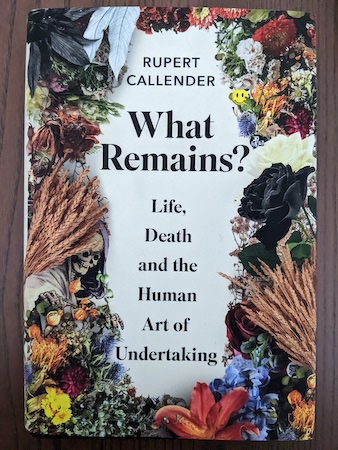
One of the highlights of this year’s reading has been Ru Callendar’s memoir What Remains?. Ru is an undertaker and founder of the Green Funeral Company in Totnes. I’ve bumped into Ru through the Discordians, and knew his book would be worth reading – but I was still taken aback by how provocative and moving it was.
He tells how he was led by his experiences to become an undertaker. After seeing an interview with the writer of the Natural Death Handbook he set himself up in business and instinctively evaded the usual shortcomings of the death industry. An example of this is the importance that Ru gives to the bereaved seeing the dead body. He also refuses to employ euphemism and falsehood. He describes his method at one point as having “scoffed at professionalism”, but found an informal, more honest approach to death was needed. There was a place for a funeral director with in jeans and a second-hand Volvo. The Green Funeral company was handed on “from wounded family to wounded family”, as well as picking up recommendations from other people involved with death, such as mortuary attendants.
One particularly interesting thread in Ru’s book is how he defines himself as countercultural. He puts forward some interesting ideas about ancestors, and describes his background as lying in punk and acid house, as well as with groups like the Diggers – both the British political dissidents and the San Francisco collective from the 1960s. He writes about his approach to undertaking as inspired by rave culture, comparing the way bereaved people should be treated to managing a bad trip.
Ru tells a great story, starting with a cold open where he makes a crop circle. There are intimate details about some of the families he’s worked for and descriptions of the people he’s encountered as colleagues – at one point Ru tells about a rival undertaker pinching a body to try and steal his business. The scenes are so well-told that I could easily see this being adapted as a film.
The book suggests that something is very wrong with the corporate approach to death – people need a kinder, more humane way to deal with bereavement. Some of the ideas seem radical, but they are also extremely compassionate. It’s hard to read this book without feeling that you’d want to be able to call on Ru when faced with a death.
For me, one of the most powerful things in the book was Ru’s discussion of boarding schools. I’ve read a number of books recently about boarding school as trauma, but Ru brings a refreshing honesty and clarity to his experience as part of the “last flush of The Tom Brown’s School Days experience”.
I was surprised to read Ru talk about his own fear of death – that he has not achieved a state of acceptance through close contact with mortality. He says that we are all living in the time before an awful event – that our normal life might be something we one day long for. But there is also the promise that, even after such events, we can endure and continue.
Sounds like a brilliant book. Yes Death needs to move back to the open field
You really need to read this one – I think you would love it.